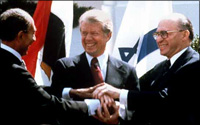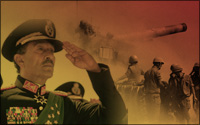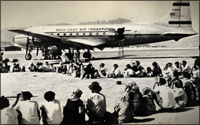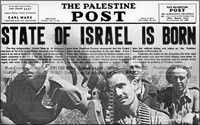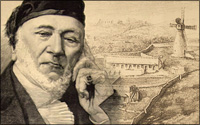 In the 1800s, the Czar of Russia dealt with his “Jewish problem” in three ways: conversion, emigration and destruction. Through a series of harsh decrees Jews would convert to Russian Orthodoxy, emigrate out of Russia or face destruction.
In the 1800s, the Czar of Russia dealt with his “Jewish problem” in three ways: conversion, emigration and destruction. Through a series of harsh decrees Jews would convert to Russian Orthodoxy, emigrate out of Russia or face destruction.
Had the Czar’s decrees been enforced with a consistent hand for a long period of time they would have almost undoubtedly accomplished their purposes. But Russia was a very corrupt society. At the county and village levels, the level of the local magistrates, it was extremely corrupt. Therefore, in many instances, the Jews were able to finesse their way out of these terrible decrees simply by paying a bribe. At other times they averted the decrees by various methods of subterfuge such as changing their last names or hiding. In short, the decrees were not enforced uniformly or consistently.
Nevertheless, the atmosphere the decrees raised had a terribly negative effect upon Jewish life in Russia and Poland. And that negative effect brought about reactions that further eroded the strength of the Jewish community and their loyalty to Jewish tradition.
Sir Moses Montefiore
In 1846, a special visitor came to Russia: Sir Moses Montefiore. Today we cannot imagine the status that he held in the Jewish world. He cut a figure that transcended Jewish life at the time. His story is not quite rags-to-riches, but a combination of fortunate events.
He was born in the late 1700s to a Sefardic family in London, and was employed as a clerk in the banking house of Rothschild in London. In the War of 1812, and the later Napoleonic War of 1815, the Rothschilds made a tremendous fortune financing both sides of the war.
They did so through their own independent network of intelligence and carrier pigeons, which allowed them to find out events before others. The legend is told how Lord Rothschild came to the British stock market on the day of the Battle of Waterloo, leaned against a pillar and started selling. No one yet knew whether Napoleon or the Duke of Wellington and the Prussians had won. However, everyone knew that Rothschild had his own independent sources of information, so his selling forced a panic in the market. As much as 15-20% of the value of the stocks on the British market fell in about three hours!
Rothschild knew that Wellington had won, that England had triumphed, and that therefore the stock market would go up. Back then there were no SEC regulations or investigations, no rules against insider trading and all of the other restrictions which exist today. After the stocks had fallen, Rothschild turned around and bought. It is reputed that on that one day alone, in the space of a few hours, a substantial amount of the Rothschild fortune, in England in least, was made.
Moses Montefiore, who was a secretary to Rothschild, joined in the selling and buying. He too became extremely rich literally overnight. With his newfound wealth he dedicated the rest of his life to philanthropy and the cause of the Jewish people. For the next almost 75 years, Montefiore would be the representative of the Jewish people in places where no other Jew could come.
He was knighted by Queen Victoria and became a leading member of the aristocratic establishment in England – yet he remained an observant Jew, fulfilling all the laws of the Torah to the best of his knowledge and ability. Many Jews—including many of the Rothschilds—lost their Jewish way when they made their millions. Montefiore further intensified it. He became a shining example.
There is a legend about him that every night before bed he would put on shrouds, go down to the basement of his mansion and lie in his coffin for a while. He said that it was a very good way to counter arrogance; to remove a certain amount of hubris that very wealthy people otherwise have. It was a reminder of reality. Whether the story is true or not is not of primary importance. The fact that they tell it about him shows us his characteristics; it shows how the Jewish people felt about him.
He lived to be 103, but had no children, and bequeathed most of his money to charity. By the turn of the century, shortly after his death, the Jewish world named many things after him as a memorial. Even today, there are hundreds of institutions, hospitals (e.g. in New York, Montefiore Hospital), schools, etc. named after Sir Moses Montefiore.
A Revival of the Blood Libel
In 1840 in Damascus there occurred the infamous blood libel, which is a horrible canard that Jews need the blood of non-Jews for ritual purposes. Blood libels had been strictly a Christian-European phenomenon. Among the Arabs, there were no blood libels because their religion never accused the Jews of killing Mohammed, and no one invented the fiction that Jews needed Arab blood for matzah, wine or anything else. Therefore, in the Muslim countries blood libels were unknown. Jews had plenty of troubles and persecution in the Muslim countries, but they did not have this and other types of accusations leveled against them that they had in the Christian countries.
The Turkish Empire, otherwise known as the Ottoman Empire, which controlled the Middle East, was an empire teetering on its death bed for 300 years before it finally fell after World War I. It had long rotted from within by corruption, immorality and narcotics. The Ottoman Empire leadership as a whole was regularly in a state of intoxication due to opium, a derivative of the poppies which grew in Turkey. Ironically, that could make it easier for others to bribe and win concessions from them.
In the 1800s, the French, especially under Napoleon III, came to Syria—what is today Lebanon—thus inaugurating the beginning of the French influence in the Middle East. It was the French who brought the blood libel as part of the heritage of Western culture to that part of the world.
The blood libel in Damascus was especially heinous because the French consul who stirred up the trouble made his accusations after the disappearance of one of the servants from the French Embassy even as he was well aware that the servant was murdered a jealous lover, and that it had nothing to do with the Jews or the Jewish community. Nevertheless, for political reasons, France pursued the matter in this fashion, and before long Turkish authorities arrested the heads of the Jewish community in Damascus.
Under torture they were able to extract the confession that there was such a ritual murder and that the Jews needed blood, etc. Of course, under torture, you can get almost anyone to say almost anything. In the Middle Ages it was believed that the only time the person told the truth was under torture! If the person voluntarily offered to tell the story it would not avail him anything; they had to torture him anyway.
In any event, under torture, the leaders of the Jewish community of Damascus confessed to an entire fairy tale, and a number of them died in prison. A great fine was levied against the Jewish community, but Jews throughout the rest of the Jewish world rose up in indignation — especially Sir Moses Montefiore. It was he who bombarded the British Foreign Office to right the wrong, until finally enough pressure was put upon the Ottoman Empire to release the remaining prisoners. The Turks apologized, but it was not really sincere and the damage had been done.
The Blood Libel of 1840 came as a shock to the Jewish world, because Jews thought that civilization had outgrown that. In particular, the Western European Jews, who were convinced that the modern world would not accommodate such terrible lies, suddenly had to deal with the specter of medieval hatred still in their midst.
Pressuring Evil-Doers
Just as he had done in Damascus, in 1846 Moses Montefiore made a trip to Russia to try to ameliorate the decrees of the Czar. He brought with him a letter from the Queen of England. It made an enormous impression on Russian Jewry, and it even made some impression on the Russian government.
He had arrived with his own golden carriage, pulled by six white horses. Wherever he went he was greeted by the great rabbis and leading Jews. He eventually had a number of audiences with the leaders of the Russian government, including one audience with the Czar himself. The Czar described him as “a distasteful little Jew.”
Despite that, his visit was a success. It represented the beginning of the exertion of outside pressures on the Czarist government. It made them uncomfortable enough to ameliorate the enforcement of the decrees.
One of the great tragedies of the Holocaust, amid all of the other tragedies, was simply the lack of any outside pressure on Hitler regarding the Jewish question. That is the unspeakable part of it. President Theodore Roosevelt, in 1908, after the Kishinev pogrom, called in the Russian ambassador and threatened to throw him out of America if Russia did not stop. It helped. However, in the United States in the 1930s, the German ambassador was not spoken to in those terms. That is really the core issue of the Holocaust, that there was no outside pressure on Germany to stop.
The Crimean War
From 1854 to 1856, the Russians engaged in the Crimean War, which Russia eventually lost. We in the West know of the war from the famous poem by Alfred Lord Tennyson, “The Charge of the Light Brigade,” which was about a suicidal cavalry charge by the British in the town of Balaklava.
The Crimean War, strange as it may seem, had its antecedents in the Land of Israel. There have always been competing claims as to who is entitled to take care of the churches in Jerusalem and Bethlehem. The competing claims have been between the Greek Orthodox religion and the Roman Catholic religion — and later the Protestants and the Russian Orthodox. Therefore, there have been many occasions where the police and the army had to intervene in order to stop what otherwise would have been bloodshed in the Church of the Holy Sepulcher or in the other churches in Jerusalem.
Turkey exploited the dispute, because depending on who provided the better bribe they gave access to the church and the right to perform the services. After a period of time, this so enraged the Christian world that England and France forced upon Turkey an agreement, under which the Christian countries were the protectors of the Christian holy places in the Land of Israel. Therefore, even though it belonged to Turkey, other countries had the legal right to make decisions about the churches: who would protect them, what roles each denomination would be assigned, etc.
The Russians were also a Christian power and wanted their share. They claimed that Turkey was somehow not living up to its part of the agreement to administer it fairly. In reality they had other motivations. Russia always wanted to be a power in the Black Sea and the Mediterranean, but Turkey blocked them. Russia also wanted a presence in the Balkans, but that was also blocked by Turkey (and Austria).
Through very skillful maneuvering they were able to pull together an alliance against Britain, France, Austria and Turkey — four enemies who hated each other. However, the Russians were so inept in executing their alliance that all four joined together against them in the Crimean War.
The war began with an invasion by British and French forces. Eventually, the city of Sevastopol, which is the capital of the Crimea and a port city, fell to these forces. The Russians were forced to retreat. In the ensuing settlement, which set boundaries and rights regarding who would be in charge the Land of Israel, Russia was given nothing. They were right back where they had started. In the interim, however, they had lost about 250,000 lives.
Liberalization
It was now abundantly clear to the Czar that the reason that they were so soundly defeated was because Russia was a backward country. The other countries (with the exception of Turkey) were more westernized and in the midst of the Industrial Revolution. Therefore, in the 1850s Czar Alexander II accepted the advice of many of his ministers who said that the way to modernize Russia was to remove all of the harsh decrees.
This liberalization culminated in 1861 when the Czar Alexander II freed the serfs – around the same time that Lincoln emancipated the slaves in the United States. This brought Russia a step closer to modernism. However, Alexander II would be assassinated in 1881 and Russia would return to its old reactionary ways. All of the gains that were made in the late 1850s and early 1860s were wiped out. Russia would become more autocratic, dictatorial and repressive – culminating in the Communist Revolution, which ended the reign of the Czars once and for all.
Nevertheless, in the attempt of the Czar to liberalize Russia, many of these harsh decrees against the Jews were repealed, or at least not enforced. There was a hiatus of about 10-15 years in the severe oppression of the Jews in Russia. It is during this hiatus that the Haskalah grew. Some Jews felt now for the first time that the Russian government was willing to allow them to exist in Russia, so it behooved the Jews to become more Russian, and Haskalah was the vehicle to do that.
Later, in the 1870s and 1880s, the Haskalah would begin to die again. The revived repressions of the new Czar made it obvious that Jews were never going to gain equality, so most Jews logically concluded: Why bother giving up our Jewish ways and becoming more Russian? Nevertheless, immediately after the Crimean War the liberalization of Russia changed the face of Jewish life.
In a broad sense, there were three reactions by Jews to this situation in Russia. One was the Haskalah, the Jewish Enlightenment. The second was the founding of the yeshiva system of education. And the third was the Mussar movement. All three came to deal with the problem of Jewish life in Russia. All three provided different answers, or at least different nuances to the answer of how to survive as Jews.
Next, we will discuss the response of Haskalah.

